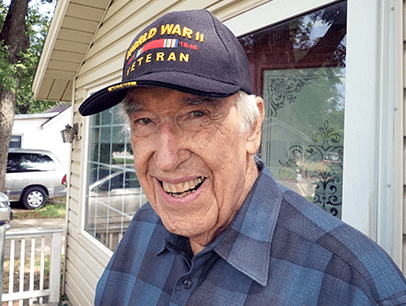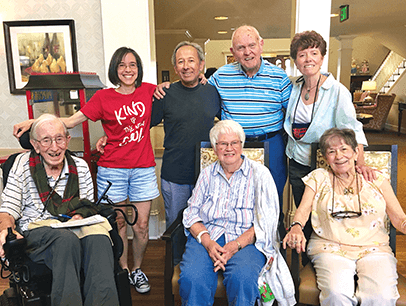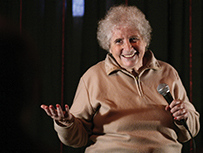
You often hear about the benefits of Toastmasters for those who are just starting their careers. While this can be true, what about seniors who have been retired for some time? Would they gain anything from Toastmasters? The short answer is: Absolutely!
Age has nothing to do with the world of benefits Toastmasters offers. In fact, some of these advantages are actually more helpful to seniors. Here are five ways Toastmasters can bring value to seniors and retirees.
1 You will stay busy and keep your mind sharp.
A challenge for some retirees is staying busy after they stop working. And seniors often are looking for ways to keep their minds sharp. The Alzheimer’s Association states, “Mentally challenging activities, such as learning a new skill, adopting a new hobby, or engaging in formal education may have short- and long-term benefits for your brain. To keep your mind active, it is important to participate in activities that expose your mind to new topics.”
Membership in Toastmasters can provide a solution to these challenges. Club members have the opportunity to stay as busy as they want. From attending meetings regularly to taking on leadership roles to working on a Pathways project, there is always plenty to do.
Jean Small, DTM, Ph.D., was looking to build on the communication skills she had developed during a long teaching career. When she retired, she joined Dynamic Speakers Club in Jamaica at the age of 68. Not only did Small win Table Topics® at her first meeting, but she quickly realized Toastmasters was the perfect group to help her accomplish her communication goals and keep her mind active. Small went on to win numerous speech contests, including the Caribbean International Speech contest at 72 years old. But she did not stop there.
At 86, she joined a French-speaking club in Haiti to improve her speaking skills in that language. She is currently working on her fifth Pathways path in French, and her sixth in English, in addition to being a member of three clubs. In 2022, she was a Triple Crown winner, which is awarded to members who achieve three education awards in a single program year. Reflecting on her Toastmasters journey, Small enthusiastically recommended joining a club to any senior looking to stay busy and mentally sharp.
“I was already older than all the members there (when I joined Toastmasters), but I did not feel old. I would tell any senior thinking of joining Toastmasters that they would bring their life experiences through the speeches they make and so share wisdom with a younger generation and have the joy of personal success and fulfilment in doing so,” says Small.
Preparing for and actively participating in meetings and other Toastmasters events engages your brain. Some seniors face varying degrees of cognitive challenges and therefore may be hesitant to join a club. However, one of the main core values of Toastmasters is respect for the individual, and existing members show empathy for everyone starting their Toastmasters journey to provide a safe haven for all.
In this Toastmasters Podcast episode, Jean Small proves age is just a number.
2 You will come across volunteer opportunities.
Many retirees want to “give back” by volunteering; Toastmasters offers many such opportunities. Members can volunteer to assist with special club events, such as open houses and speech contests. They can also take the Toastmasters experience into their communities by establishing Gavel Clubs, running a Youth Leadership Program, or even helping host a Speechcraft course.
There are also tremendous opportunities to mentor newer members. Charles Kennedy, DTM, is a recent retiree and member of Niagara On The Lake Toastmasters in Ontario, Canada. As one of the club’s most experienced members, Kennedy currently mentors five others. Recognizing the challenges of mentoring so many, he set up a weekly Zoom meeting for all his mentees.
“One of the greatest benefits for seniors participating in Toastmasters is the sense of connection and of being seen and heard.”
–Cara Wasden“The group session is a great forum where mentees can learn from each other and share their experiences,” Kennedy says. “It is also a very rewarding experience for me, because I get to see firsthand the power of a nudge accompanied by a kind word of encouragement.”
Cara Wasden, a member of Toast of Petaluma club in Petaluma, California, volunteers her time by conducting weekly Table Topics sessions at a local senior community. While not a senior herself, Wasden loves bringing the benefits of Table Topics to the group, and recommends starting one at your local senior living community.
3 You can find a new sense of purpose.
Retirees often feel lost when they realize their identity was based largely on their career. Joining a Toastmasters club can provide a new purpose. Setting a goal of completing a Pathways level or project or joining the club’s executive committee, for example, can bring a new sense of purpose. Some retirees find that they miss the challenge they had when working or leading teams, and becoming a Club President (or taking on any club officer role) can fill that need.
There is perhaps no better example of a senior Toastmaster finding that new purpose than Julie Kertesz, DTM. Kertesz is a French citizen living in London, England. At 73 she rediscovered Toastmasters. She is currently a Club President and member of three clubs, has held most club officer positions, is a past U.K. Pathways ambassador, has achieved two DTMs, writes a blog, and holds a weekly storytelling session on Zoom for school kids in India. Kertesz is now 88 and still going strong. Talk about a newfound sense of purpose!
4 You will make new friends.
In retirement, you often lose a large part of your social network and the regular interactions you enjoyed in your career. Toastmasters helps fill this void. Joining a club provides instant access to new friends. You discover the opportunity to meet and engage on a regular basis—either in person or online—with a group of people who share a common interest.
There are also health benefits to joining a Toastmasters club. The Alzheimer’s Society advises that “remaining socially active may support brain health and possibly delay the onset of dementia.” As an added bonus, most Toastmasters clubs have members representing multiple generations, thus giving you exposure to a broader range of experiences. The opportunity to make new friends outside your age group can be very rewarding.
As Wasden notes, “One of the greatest benefits for seniors participating in Toastmasters is the sense of connection and of being seen and heard.”
5 You can network and stay ahead of the curve.
There are many people who decide to semi-retire or become entrepreneurs after finishing their initial career. Toastmasters offers opportunities to expand your network at the club, Area, and District levels. Additionally, you can virtually visit clubs around the world and gain connections from different countries.
As a Toastmaster, you will also keep up with current communication trends, such as meeting and presenting in an online format, gaining cross-cultural etiquette, and learning how to start a podcast or blog. All of these are vital to entrepreneurs and seniors who are still working in some capacity.
If you are a senior and already a member, consider new ways that Toastmasters could enrich your life. If you know a senior who hasn’t yet experienced Toastmasters, share this article and encourage them to visit a club as your guest. Offer to bring them with you—we all know that first visit can be a little intimidating.
As you have seen, when you combine Toastmasters and seniors, the possibilities are endless!
Greg Lewis, DTM is a retired business professional who strives to inspire and encourage his fellow Toastmasters. He and his family live in Fonthill, Ontario, Canada.



 Previous
Previous

 Previous Article
Previous Article


